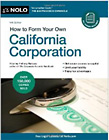
Incorporate business in U.S. |
 | ||
|
| |||
Choosing to Incorporate as an S CorporationAn "S" corporation is a company that forms as a C corporation and then chooses special tax status that makes it a "pass-through" entity, like an LLC. And S corporations' profits and losses can be passed directly to the owners without first being taxed at the corporate level, because, unlike a C corp., an S corp is not a separate taxable entity. Thus, choosing S status eliminates the double taxation issue faced by owners and shareholders of C corps.To become an S corporation, you must first file as a regular C corporation, as the articles of incorporation you file with the state are the same for both the C and S corporations. Once the state in which you're incorporating sends you back your paperwork, you fill out an IRS form 2553 ("Election by a Small Business Corporation) and send it in to the IRS. What Are the Benefits of Electing S Corporation Status?Electing S corp status confers a number of benefits. These include:What Are the Negatives of Electing S Corporation Status?What Documents Do I Need to Form an S Corporation?You'll need the same documents as for a C corporation (articles of incorporation, bylaws, organizational board resolutions, stocks certificates and a stock ledger), PLUS one more: the IRS form 2553 ("Election by a Small Business Corporation). As mentioned above, this is filed with the federal government after you receive back the other documents of incorporation from the state.INCORPORATE NOW!
Want more information about registering a company? Visit our Guide. Check out incorporation fees by each state. Tip: Did you know that Delaware and Nevada are top two incorporation states? Ready to register a company? Choose one of these great online incorporators: Business Filings The Company Corporation My Corporation (Intuit®) |
Advertisement |
||
©2025 Incorporate America.com, Form a Company informational site. About Privacy Site map Information here does not constitute a legal advice. Please contact an attorney or accountant for specific expertise.
| |||
choosing to incorporate as an s corporation


